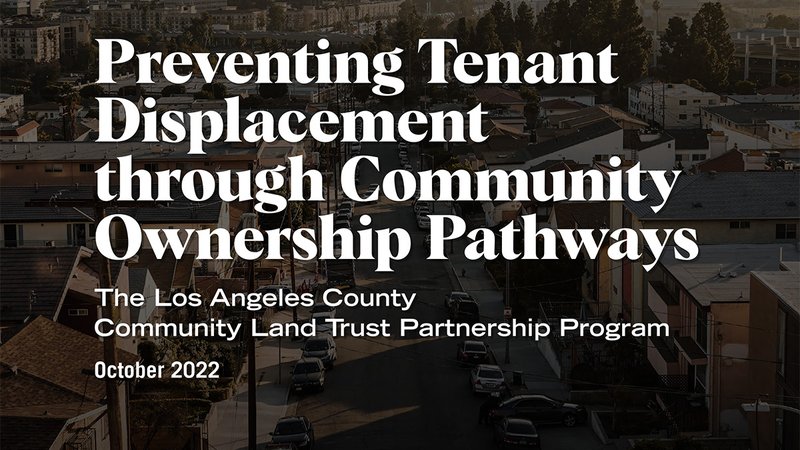Community Land Trust Report Showcases Power of Community Ownership
A new report released by the Los Angeles Community Land Trust Program—a $14 million pilot initiated two years ago with the support of the Los Angeles County Board of Supervisors—showcases the power of community ownership strategies.
The innovative partnership explores the Community Land Trust (CLT) model to address long-term housing affordability challenges and systemic racial inequities for immigrant, working class, communities of color. It additionally aims to stem the tide of historic displacement and disinvestment in these communities that has only intensified since the start of the pandemic.
A Community Land Trust is a nonprofit organization designed to ensure community stewardship of land.
The independent report—commissioned by Liberty Hill Foundation with support from the California Endowment—examines the implementation of this acquisition and rehabilitation program and makes the case that CLTs can be an important model in responding to the housing and homelessness crisis as an alternative to traditional affordable housing.
“As the pandemic exposed more vulnerable Angelenos to displacement, a coalition of activists, public agencies, community-based organizations, and community land trusts (CLTs) all came together in an unprecedented way,” said Los Angeles County Supervisor Hilda L. Solis, First District. “And we seized this opportunity to conceive a new, forward-thinking model of affordable housing preservation in the region that can serve as a model for other municipalities.”
The pilot enabled five established Community Land Trusts that currently constitute the Los Angeles Community Land Trust Coalition to acquire, rehabilitate, and preserve tax-defaulted properties for long-term affordable housing.
The initial county investment helped preserve eight multifamily properties with a total of 43 residential units across all five supervisorial districts—which enabled 110 individuals to live in stabilized affordable housing. The program was then further expanded to secure unsubsidized multifamily housing intended to protect renters at risk of eviction and homelessness due to the economic fallout from the COVID-19 pandemic. Currently, 95 percent of the units were occupied by households consisting of Black, Indigenous and people of color.
“Thank you for supporting this program. It was a success to have a stable and peaceful home and to be able to live in this building where we’ve been for so many years,” said Guadalupe Hernández, a Beverly-Vermont CLT tenant. “We had been harassed by our landlord, but now we don’t have to experience that treatment anymore. We don’t know when we’re going to buy a traditional home, but we also don’t want to live without homeownership. This is important work, and just like we benefited from this and now have hope, I know there are still people out there who are homeless and need this support as well.”
Among the report’s major findings is the recommendation that the Community Land Trust model become a permanent program across the City and County, with expanded public and private funding to support acquisition and rehabilitation of more small-scale at-risk multifamily properties. The report also recommends a variety of other supportive measures that can be taken to streamline the process and expand the pool of property acquisition opportunities, including investing in additional legal, real estate and technical expertise, increasing philanthropic and public investment in CLTs and other approaches to decommodify housing.
One important step that would enable this expansion would be the passage of Measure ULA in LA City this fall, which would use a real estate transfer tax on property sales over $5 million to fund a variety of innovative solutions to protect renters and to build and preserve affordable housing units, including through CLTs.
“Measure ULA is a once-in-a-generation opportunity to fund essential, creative policies that will attack our housing crisis at the root,” said Shane Murphy Goldsmith, President and CEO of Liberty Hill Foundation. “This report demonstrates how important it is to pass this measure to ensure we can continue funding efforts like the CLTs in this report that treat housing as a human right, not a market commodity, and empower communities to organize and build power around their own solutions.”
